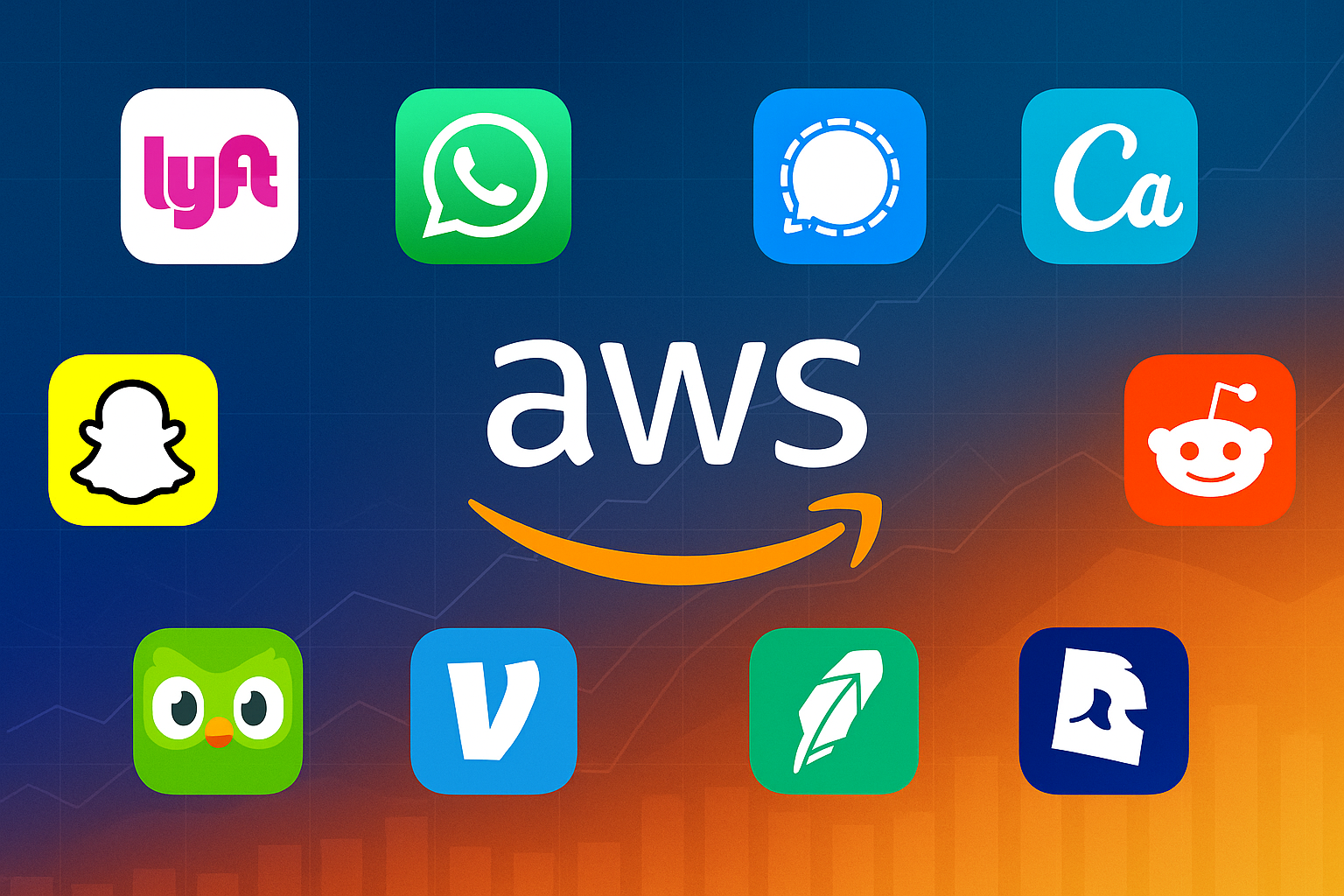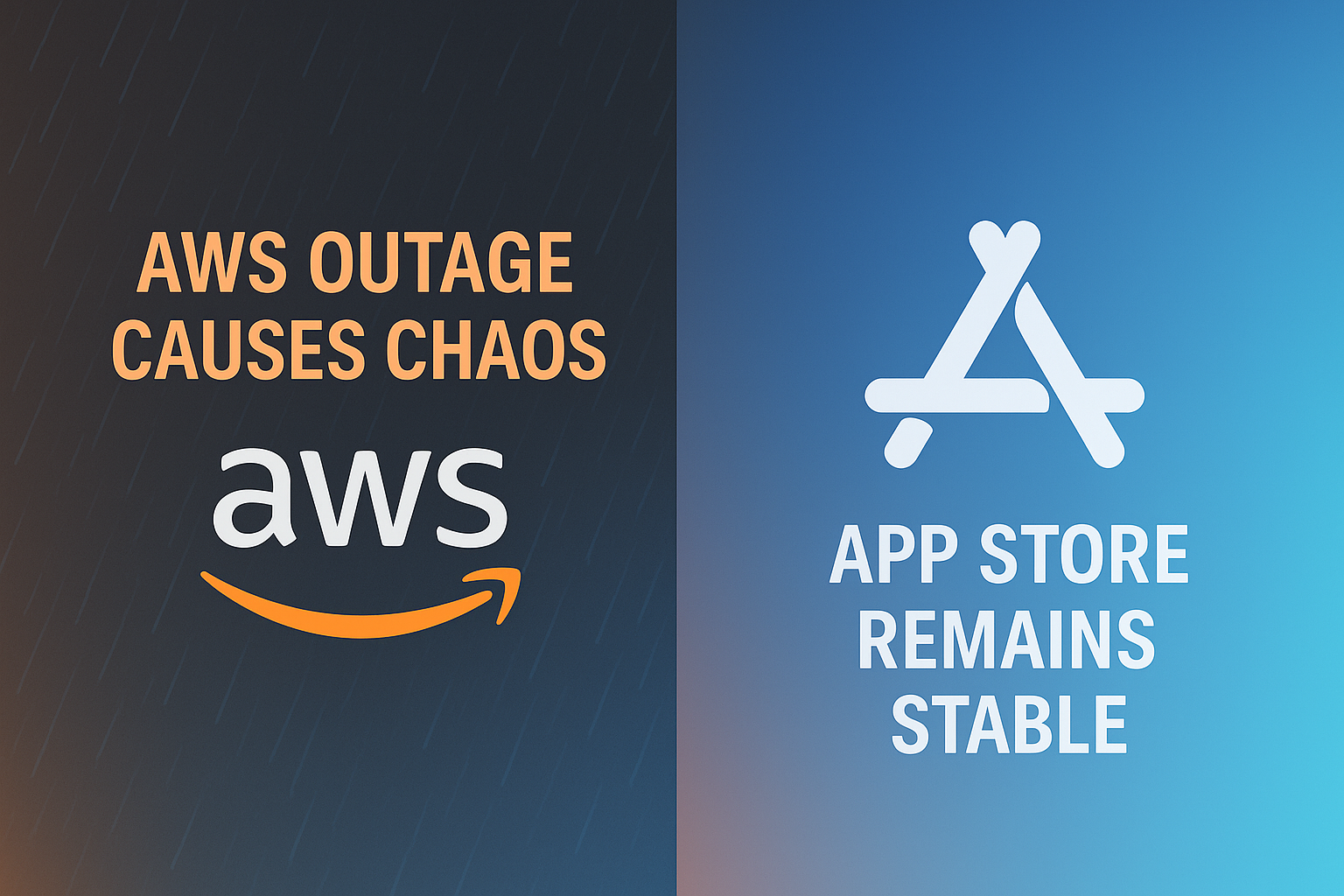Did the AWS Outage Really Dent App Store Performance? What the App Store Data Tells Us
When AWS Goes Down, Does the App Store Follow?
The internet went into mild panic mode on October 20, 2025, when an AWS US-East-1 outage caused widespread disruptions to some of the world’s biggest digital platforms — from Snapchat and Reddit to Venmo, Fortnite, and Roblox.
With so many major mobile apps running critical infrastructure through AWS, we wanted to know: did this outage actually move the needle on App Store performance?
Thanks to our app store data from APPlyzer Chat — which tracks brand search interest, organic downloads, and grossing ranks — we dug into a month of U.S. iOS performance data to find out.
A Quick Recap: What We Analysed
We pulled 30 days of App Store app data for twelve apps widely reported to be impacted by the outage:
Lyft, Snapchat, Reddit, Venmo, Roblox, Fortnite, Duolingo, Robinhood, Ring, WhatsApp, Signal, and Canva
Across each, we reviewed three ASO performance dimensions:
Brand Search Interest – App Store keyword impressions (a proxy for user demand and discovery)
Organic Downloads – Estimated installs over time
Grossing Ranks – An indicator of in-app monetization and revenue flow
Together, these give a 360° app store data lens on both user behaviour and store-side performance.
So… Did the AWS Outage Have Any Real Impact?
In short — no measurable one (sorry to disappoint!)
Despite some brief downtime, the app data paints a remarkably stable picture across all three metrics. In our view, given the outage wasn’t sustained for long enough, it didn’t have any notable effect on brand interest, and the only likely impacts were on customer satisfaction & potentially some loss of revenue. What the data shows us, which is a little more surprising, is that there were very few (if any) winners from this and users stuck with their apps rather than looking for alternatives. Maybe we’re not as fickle as we thought after all :-)
1️⃣ Brand Search Interest Stayed Rock Solid
Across the board, there’s no sustained drop in App Store brand searches after October 20.
WhatsApp: Flat at ~44–47k daily impressions
Snapchat: 37–39k, showing normal weekend surges
Roblox: 20–24k, little movement
Fortnite: Gently rising through mid-October
Venmo / Robinhood: Notable dips occurred before the outage
Duolingo, Canva, Ring, Lyft, Signal: Routine weekly patterns
This shows that user demand and discoverability weren’t dented by the AWS disruption.
2️⃣ Organic Downloads Held Steady
The download volume charts across all twelve apps show business as usual patterns — no multi-day cliffs or volatility after the 20th.
Gaming titles (Fortnite, Roblox) actually spiked slightly mid-month.
Communication and finance apps (Snapchat, Venmo, Robinhood) displayed stable or recovering installs.
Even the biggest AWS customers maintained healthy install momentum — proof of how resilient the App Store ecosystem has become.
3️⃣ In-App Revenue (Grossing Ranks) Didn’t Flinch
Grossing ranks — a proxy for monetization health — tell the same story:
Snapchat: Holding Top 20 consistently
Duolingo: Stable, even peaking mid-October
Canva: Flat around Top 40
Roblox & Fortnite: Strong, improving into late October
Even with backend interruptions, App Store revenue performance remained steady (enough). Users didn’t churn, subscriptions continued, and microtransactions flowed normally.
Our Take: App Store Data Proves How Resilient Apps Have Become
This analysis shows the power and precision of App Store data. With the right lens, you can measure not just app visibility, but how resilient your digital brand is under real-world stress.
App Store data gives marketers and product teams the ability to:
Spot micro-trends that traditional analytics miss
Quantify brand resilience after outages or negative press
Benchmark organic recovery in near real-time
Correlate App Store performance with wider technical or marketing events
In short — App Store data is your early warning system for how infrastructure, outages, or global events ripple through consumer behaviour.
The chart clearly shows minimal impact to brand interest/search before and after the outage, so brands need not worry about long term effects…
How You Can Use App Store Data Like This
At ConsultMyApp, we combined APPlyzer’s granular App Store data into ChatGPT 5 to build APPlyzer Chat which enabled us to:
Detect store ranking anomalies in real time
Quantify download elasticity to events (like outages or feature drops)
Uncover hidden links between search demand and monetization performance
If you’re serious about growth, App Store data isn’t just about keyword rankings — it’s about understanding the entire app economy around your brand.
TL;DR
The AWS outage caused chaos across the web — but not in the App Store (well not for the apps, but the App Store Connect issues it created were another thing entirely....)
According to our App Store data, downloads, brand search, and revenue stayed solid.
And that tells us something big: the app data is now sophisticated enough to prove resilience.
About This Analysis
Data collected via APPlyzer Chat for the U.S. iOS App Store, covering September 22 – October 22, 2025.
Metrics include App Store keyword impressions (brand search), download volume estimates, and grossing ranks.
Apps analysed: Lyft, Snapchat, Reddit, Venmo, Roblox, Fortnite, Duolingo, Robinhood, Ring, WhatsApp, Signal, Canva.
Want To Unlock This Level of App Data?
We use deep ASO analytics to help brands understand how marketing, outages, and trends impact real-world performance.
→ Talk to our ASO specialists to see how you can turn App Store data into action, or why not try APPlyzer Chat for yourself (for free!)?
































